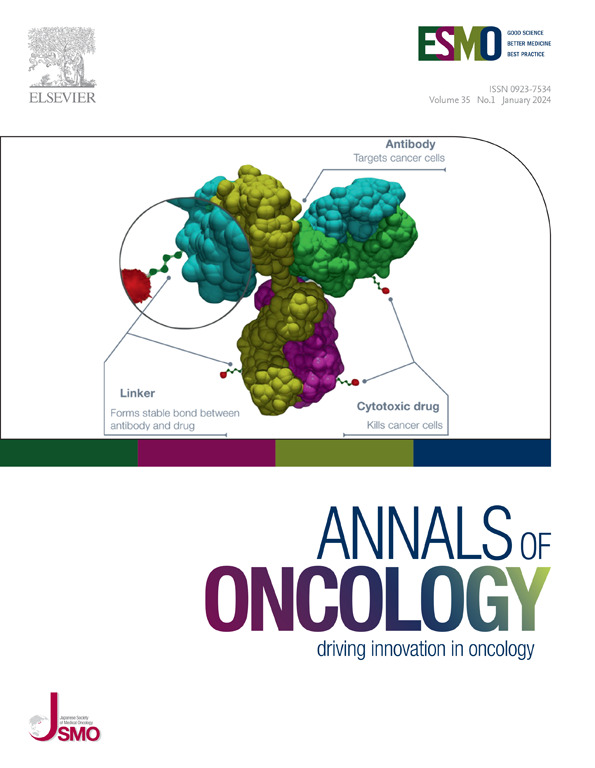Minimal residual disease in colorectal cancer. Tumor-informed versus tumor-agnostic approaches: unraveling the optimal strategy
IF 56.7
1区 医学
Q1 ONCOLOGY
引用次数: 0
Abstract
Background
Circulating tumor DNA (ctDNA) analysis has emerged as a minimally invasive tool for detecting minimal residual disease (MRD) in colorectal cancer (CRC) patients. This enables dynamic risk stratification, earlier recurrence detection and optimized post-surgical treatment. Two primary methodologies have been developed for ctDNA-based MRD detection: tumor-informed strategies, which identify tumor-specific mutations through initial tissue sequencing to guide ctDNA monitoring, and tumor-agnostic approaches, which utilize predefined panels to detect common cancer-associated genomic or epigenomic alterations directly from plasma without prior tissue analysis. The debate over which is superior in terms of sensitivity, specificity, cost-effectiveness and clinical feasibility remains unsolved.
Design
This review summarizes studies published up to November 2024, exploring the utility and performance of tumor-informed and tumor-agnostic approaches for ctDNA analysis in CRC. We evaluate the strengths and limitations of each methodology, focusing on sensitivity, specificity and clinical outcomes.
Results
Both strategies demonstrate clinical utility in post-operative risk stratification and guiding adjuvant chemotherapy decisions in CRC patients. Tumor-informed approaches generally exhibit superior sensitivity and specificity for recurrence prediction, attributed to their personalized tumor profile designs. However, these methods are limited by the need for prior tissue sequencing and higher associated costs. In contrast, tumor-agnostic approaches offer broader applicability due to their reliance on plasma-only analysis, although with relatively lower sensitivity. Technological advancements, including fragmentomics and multi-omic integrations, are expanding the capabilities of ctDNA-based MRD detection, enhancing the performance of both approaches.
Conclusions
While tumor-informed strategies currently offer higher precision in MRD detection, tumor-agnostic approaches are gaining traction due to their convenience and improving performance metrics. The integration of novel technologies in ongoing clinical trials may redefine the optimal approach for MRD detection in CRC, paving the way for more personalized and adaptive patient management strategies.
结直肠癌的最小残留病灶。肿瘤信息与肿瘤诊断方法:探索最佳策略。
背景:循环肿瘤DNA (ctDNA)分析已成为一种检测结直肠癌(CRC)患者微小残留疾病(MRD)的微创工具。这使得动态风险分层、早期复发检测和优化术后治疗成为可能。基于ctDNA的MRD检测有两种主要方法:肿瘤知情策略,通过初始组织测序来识别肿瘤特异性突变,以指导ctDNA监测;肿瘤不可知方法,利用预定义的面板直接从血浆中检测常见的癌症相关基因组或表观基因组改变,而无需事先进行组织分析。关于哪种方法在敏感性、特异性、成本效益和临床可行性方面更优的争论仍未解决。设计:本综述总结了截至2024年11月发表的研究,探讨了肿瘤知情和肿瘤不可知方法在CRC中ctDNA分析的效用和性能。我们评估了每种方法的优势和局限性,重点关注敏感性、特异性和临床结果。结果:两种策略在结直肠癌患者术后风险分层和指导辅助化疗决策方面均具有临床应用价值。肿瘤知情的方法通常在复发预测方面表现出优越的敏感性和特异性,这归功于其个性化的肿瘤概况设计。然而,这些方法受到需要预先组织测序和较高相关成本的限制。相比之下,肿瘤不可知的方法提供了更广泛的适用性,因为它们只依赖于血浆分析,尽管相对较低的敏感性。包括片段组学和多组学集成在内的技术进步正在扩大基于ctdna的MRD检测的能力,增强了这两种方法的性能。结论:虽然肿瘤信息策略目前在MRD检测中提供了更高的精度,但肿瘤不可知方法由于其便利性和改进的性能指标而受到关注。在正在进行的临床试验中,新技术的整合可能会重新定义CRC MRD检测的最佳方法,为更个性化和适应性的患者管理策略铺平道路。
本文章由计算机程序翻译,如有差异,请以英文原文为准。
求助全文
约1分钟内获得全文
求助全文
来源期刊

Annals of Oncology
医学-肿瘤学
CiteScore
63.90
自引率
1.00%
发文量
3712
审稿时长
2-3 weeks
期刊介绍:
Annals of Oncology, the official journal of the European Society for Medical Oncology and the Japanese Society of Medical Oncology, offers rapid and efficient peer-reviewed publications on innovative cancer treatments and translational research in oncology and precision medicine.
The journal primarily focuses on areas such as systemic anticancer therapy, with a specific emphasis on molecular targeted agents and new immune therapies. We also welcome randomized trials, including negative results, as well as top-level guidelines. Additionally, we encourage submissions in emerging fields that are crucial to personalized medicine, such as molecular pathology, bioinformatics, modern statistics, and biotechnologies. Manuscripts related to radiotherapy, surgery, and pediatrics will be considered if they demonstrate a clear interaction with any of the aforementioned fields or if they present groundbreaking findings.
Our international editorial board comprises renowned experts who are leaders in their respective fields. Through Annals of Oncology, we strive to provide the most effective communication on the dynamic and ever-evolving global oncology landscape.
 求助内容:
求助内容: 应助结果提醒方式:
应助结果提醒方式:


